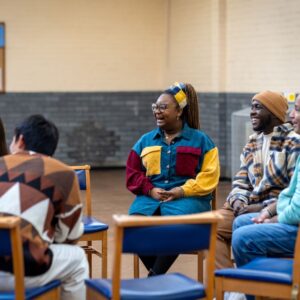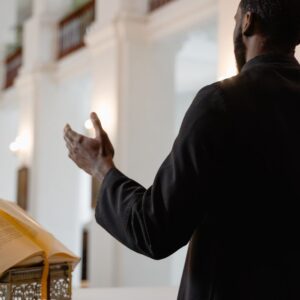This article is part one of a three-part series covering the three components that we, The Center for Transforming Engagement, have identified that help people to remain resiliently flexible. (you can find parts two and three by clicking the links below)
1. Peers who offer a community of support;
2. Practices that contribute to health of body, mind, and spirit
3. Purpose in our work that meets meaning in our life’s
narrative.
Streams (Elements) of Resilience
In the months prior to the launch of Resilient Leaders Project, the team (at that point Dr. Derek McNeil, Andrea Sielaff, and myself) spent time sifting through research on resilience, trying to come up with a cohesive way to understand what leads to thriving, especially after suffering.
Eventually, we expanded and consolidated categories into three streams of resilience — people, practice, and purpose — each necessary but not sufficient for resilience.
When I speak about the three streams of resilience, I always start with ‘people’ because it’s the most vital.
Relationships are the single most important factor to our wellbeing, the most prevalent source of meaning, and often raise the first warning signs when we’re approaching unhealthiness or burnout.
Bruce Perry, an expert in the field of trauma, was asked about effective treatments for children in adverse circumstances. He listed of series of treatments that had proven effective, then summarized them: Effective treatments are “anything that increases the quality and number of relationships in the child’s life.” I suspect the same is true for adults.
It would be easy to simply implore leaders to make relationships a higher priority, to find more time for conversations over coffee, to reach out to that contact via phone, or to gather an old friend group for dinner. We all know we should be making more time for the people who make our life and work meaningful. Most of us have some sense that our work-life would improve if we had deeper relationships with coworkers in our institution or colleagues in our field. Many of us even actively desire to do so.
So what keeps us from doing prioritizing existing relationships, or pursuing deeper professional relationships? What makes us resistant?
I know that I have often resisted relationships because they feel so vulnerable. It’s actually vulnerable in two ways: the vulnerability of sharing and being known, of trusting another with parts of my story, parts of myself. And it’s vulnerable as a need that I can’t meet on my own; it’s an ongoing dependency on others—and they could fail me at any moment.
I have immense control over my practices—eat more vegetables and less sugar, drink more water and less caffeine and alcohol, move regularly. And I have some control over my purpose—the work I do, the narratives I tell to allow meaning to arise from my life.
“People,” on the other hand, require that someone else show up, and do so somewhat regularly. And people aren’t always incredibly reliable—they have busy lives, other commitments, other relationships. They want to go home and “recharge” with a yoga practice (or, let’s be honest, a glass of wine and Netflix) as much as I do. I hate being dependent on others; my heart has been so often bruised.
Something to consider, in the question of what makes us resistant to investing in relationships: Social pain travels along the same pathways in the brain as does physical pain.
“Social pain” should more accurately be called “pain.”
Perhaps the risk of hurt is worth it to us when those relationships are purely chosen — partners or friends — or when they have the expectation of being long term, as with family. But work-based relationships are often people we wouldn’t have chosen ourselves, and people we know we may only work with for a season or, at most, a few years. And when we’re in the same room, it’s often to accomplish a project; time spent connecting interpersonally can feel like a distraction from the primary task, a waste of time. From a capitalist standpoint, it is.
But our point of reference isn’t profit or even efficiency; it’s Christ. Jesus seems to often be stopping to develop relationships with lepers, beggars, the blind, Centurion soldiers, tax collectors, a woman at a well — people who aren’t obviously contributing to his mission. But he engages them openly and unhurriedly. He really notices them, is curious about them, connects with them.
Jesus’s values are not productivity or efficiency. He doesn’t care that he’ll likely never see this person again. The one time we see someone healed that he didn’t choose — the bleeding woman — he takes the encounter as an opportunity to learn, to be corrected, to repent.
If I take Christ seriously, if I manage — in moments — to live in ways that affirm the incarnation, then I would take relationships seriously as an opportunity for deep encounter, for learning, and for healing. That would be true regardless of whether we meet together by choice or work affiliation, regardless of how long we’ll know each other, and regardless of how productive or efficient that connection is.
How is The Center Working Towards Deepening Relationship
In Resilient Leaders Project, we start each team meeting with a gathering question, often asking about how we are (or aren’t) living into an aspect of our resilience. When we first began, I was concerned that this check-in began to take an increasing amount of time — we had agendas! tasks! projects! My concerns diminished when we hit a season that I really needed it.
A health crisis was followed by a personal crisis that left me feeling isolated from both my church and friend communities. That, in turn, raised doubts inside myself about my work on this project.
I pretty quickly realized that the questions I’d been asking in our team gathering time were the very questions I needed to be answering. I risked deeper levels of vulnerability in responding to my direct reports, partnering faculty, and supervisor. In one meeting, they pursued my response until, in tears, I confessed my most inner doubts: Who am I to lead a project on resilience when I’m crumbling? And these kind, competent, composed people said to me with all sincerity: You are doing such good work in the midst of hard circumstances — that’s exactly what resilience is. Who better than you to lead this work?
Resilience is not about being strong — even a rock will crack under enough force, or melt under enough pressure. True resilience is flexible, it bends and stretches.
A resilient leader isn’t stone-faced, but allows their heart of flesh to be visible — even magnified through tears.
I still send out agendas that include both the “gathering question” and the “primary task,” but if I’m honest, the gathering is the primary task. If we, as a team, are not able to develop a “people” stream of resilience together, to develop deep relationships in a working context, to need one another, to be curious about our resistance to vulnerability — how could we ask participants in the program to do that work? And, perhaps more essential to us, how could we persevere as whole-hearted humans as we pursue this work?
Learn to engage others, and yourself, with greater compassion.
Resilience circles offer a unique, transformative journey of personal growth, connection, and resilience. Go here to get more information on resilience circles.
You can also download The Center’s valuable resource: The Resilience Report to explore more about the three components of resiliency.










0 Comments